Getty
The 1962 World Cup, two years after a devastating earthquake, was an almost impossible feat and at the same time the ugliest football tournament ever played – glorified by the Brazilian magician Garrincha, who should have been suspended in the final.
In 1962, the career of the young genius Pelé seemed to have burned out and over. And yet Brazil won the football world championships with the fabulous, bow-legged folk hero Garrincha (the “little bird”). This after the World Cup in Chile had already degenerated into lawlessness and chaos on the second day of play when the hosts dueled with the Italians.
In Chile, after the devastating earthquake two years earlier, there was a patriotic spirit of optimism. The national football team, as the ambassador of this national feeling, toured the country for 18 months before the World Cup and also won sympathy and support money with performances abroad.
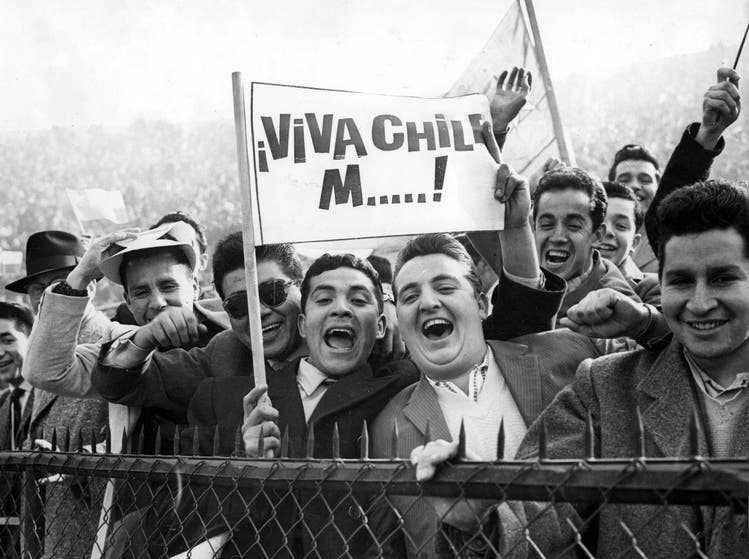
A spirit of optimism after the earthquake two years earlier: Chilean fans before the game between Brazil and the World Cup hosts in June 1962.
Only two journalists from the new economic boom in Italy, Corrado Pizzinelli for “La Nazione” and Antonio Ghirelli from “Corriere della Sera”, opposed the image of the Chilean resurrection with their unembellished perspective. The idea of holding a World Cup here was “pure madness”, according to the “Corriere”. The metropolis of Santiago is a nasty swamp, the phones don’t work, a telegram costs “a leg and an arm”, taxis are “as rare as faithful husbands”.
“La Nazione” also described Santiago as a “terrible place”, whole neighborhoods are characterized by prostitution. The Chilean people suffer from poor nutrition and poverty, Chileans are “illiterate” and “alcoholics”.
These insults found their way back to Chile immediately – they had the effect of a declaration of war. “El Mercurio” printed the full text of the articles and distributed them on the streets of Santiago, including flyers. The “Clarin” even proclaimed the “World War”, which was then fought on the second day of the tournament, on June 2nd, in the cauldron of indignation in Santiago. The Italians knew what was in store for them: before the start of the game, they distributed bouquets of flowers to the few women in the stands, but they were thrown back onto the field.
How English referee Ken Aston became the inventor of card justice
The English referee Ken Aston whistled for the first foul against Chile 12 seconds after the start of the game. But back then, referees didn’t have cards with which to sanction such offences. Later, at a traffic light on Kensington High Street in London, Aston, a former career soldier and colonel from the colonies, came up with the idea of applying the red and yellow light signals to football. This is how he became the inventor of card justice.
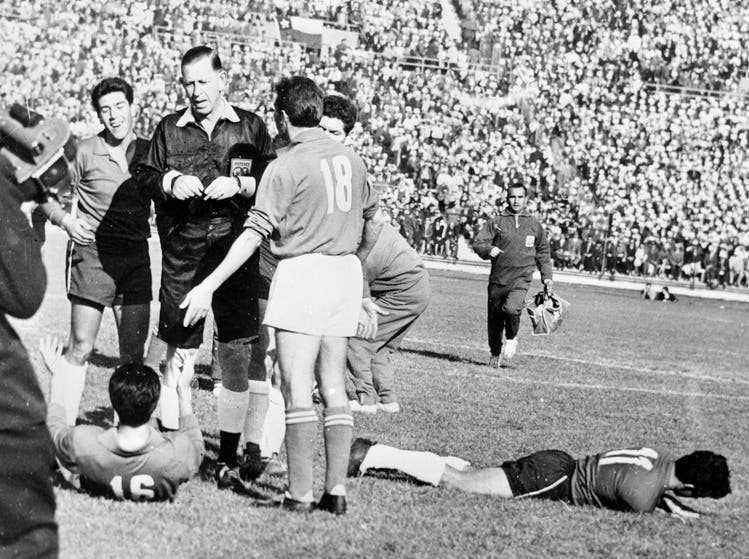
The referee Ken Aston (second from left) has to arbitrate again and again.
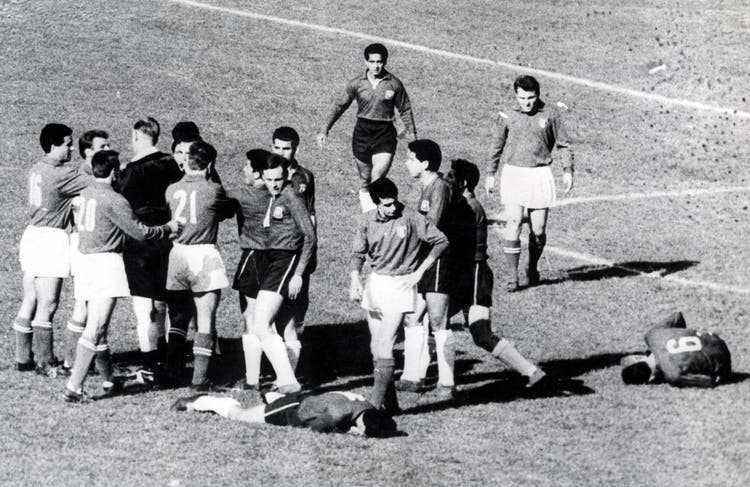
First, the Italian Mario David (lying on the right) fouls the Chilean Leonel Sánchez (lying on the left). He retaliates with a left hook, whereupon both players remain on the ground.
After five minutes, Aston used all his physical strength to settle the first scuffle between the two teams. Chile’s Honorino Landa fouled Italy’s Giorgio Ferrini several times with impunity. This step to vigilantism and missed Landa a kick in the abdomen. Aston then sent the Italian off, which the referees were able to do at the time, but Ferrini theatrically presented himself as a victim and refused to leave the field for eight minutes – before he was taken away by the police.
Just before the break, Italy’s Mario David sent his opponent Leonel Sánchez onto the pitch. The Chilean, son of a professional boxer, returned the favor with a classic left hook. The referee Aston ignored it. But after David retaliated by kicking Sánchez in the head shortly thereafter, only nine Italians remained in what looked more like rugby or boxing than football. The ex-officer Aston said he felt “like in a military maneuver”. Police officers repeatedly stormed onto the field and separated the militant guerrilla fighters.
Jaime Ramírez gave Chile the lead with a header after 73 minutes, followed by Jorge Toro three minutes later. The Chilean officials suspected the Italians of doping; But there were no controls. BBC commentator David Coleman delivered the harshest verdict when he announced the game would be recorded: “What you are about to see is the most stupid, appalling, disgusting and degrading portrayal of football in the history of football.”
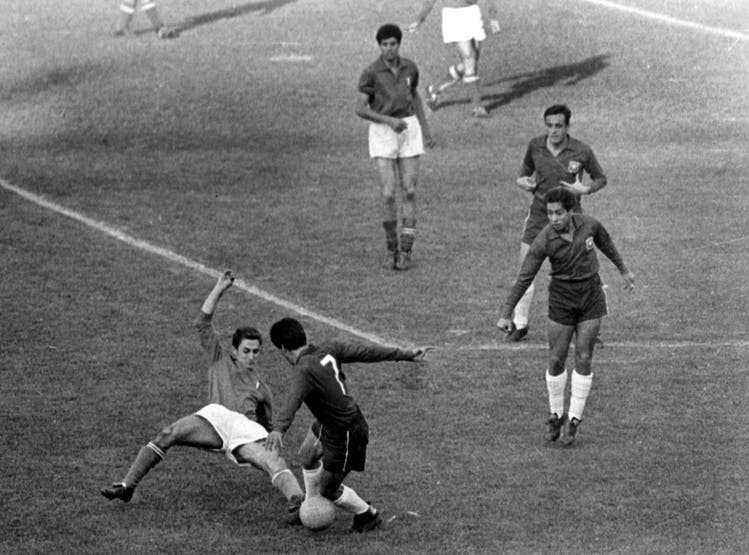
Chile wins the group game against Italy 2-0 – it’s a game with lots of attacks and fouls.
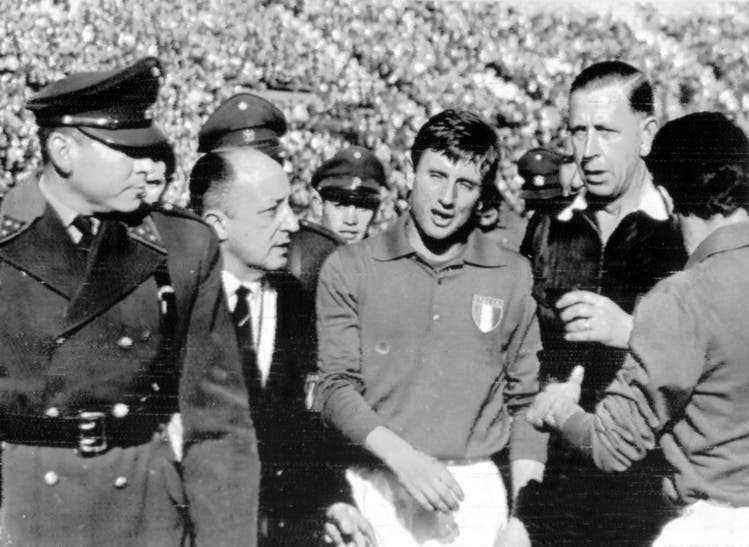
Police officers and referee Ken Aston (second from right) lead Italy’s Giorgio Ferrini (center) off the field. He had kicked his opponent in the groin – and then remained lying there for a few minutes.
There were no direct TV transmissions to Europe – even a Swiss person becomes a victim of an accident
The black-and-white images from Chile flickered across European television screens a day late; Direct transmissions across half the globe were not yet technically possible. What happened at that World Cup, which took place from May 30th to June 17th, 1962, remains a vague tradition. Five days after the humiliation against Chile, the Italians won almost unnoticed 3-0 against Switzerland in a group game that has become meaningless.
A Swiss was also one of the casualties of the rampant attacks on Chilean territory: Norbert Eschmann, originally a goldsmith, a globetrotter and one of the first Swiss professional footballers, with career stages from Lausanne-Sports to Red Star Paris and Olympique Marseille, was followed by the German Horst Szymaniak 12 minutes broken the fibula. The Swiss with coach Karl Rappan lost all of their three games against Italy, Germany and Chile. Eschmann later became one of the smartest football explainers in the country at “24 heures”.
For Chile, the victory against Italy in the patriotically embellished “Battle of Santiago” meant a bridge to a fragile normality after two years earlier, on May 22, 1960, the earth had trembled with unprecedented violence (9.5 on the Richter scale) and the 4275-kilometer-long giant tapeworm on the west coast of the Cordilleras had almost been cut in two. Thousands of people died. The country’s infrastructure, transport routes, industrial plants and entire inner cities were largely destroyed, and the coast was flooded by tsunamis.
Chile’s path ends in the semifinals – Pelé is no longer there because he is injured
Only four of the originally planned nine arenas could be repaired, including the company sports field of the US copper producer Braden in Rancagua and the small stadium in Arica in the far north. During the World Cup, the stadiums remained half empty except for Chile’s appearances. The country had surprisingly won the 1956 Fifa Congress to host the World Cup, 32 votes to 11 over Argentina, thanks to lobbying by federation president and banker Carlos Dittborn, who then died at the age of 41 six weeks before the start of the World Cup. With him, the organization lost its most important representative.
For Chile’s team, the path ended in the semifinals against Brazil – then there was still a win in the small final against Yugoslavia. But the Brazilians, as defending champions, also seemed to get lost in this tournament of anarchy and disorder. The wonder boy Pelé, the discovery of the 1958 World Cup in Sweden, was injured after constant attacks on his feet in the second group game against Czechoslovakia and was not used again. Four years later in England he became the victim of a veritable tactical manhunt, which the referees did not punish. It was not until 1970 in Mexico that he celebrated another great triumph with Brazil at the age of 32.
In Chile, the Brazilians conjured up a contrasting program to the ugly face of football. Their leader: Garrincha. The dribbling artist was football’s first mass entertainer after the Englishman Stanley Matthews, a magician like later Maradona and Messi. “He played like a dog with the ball,” was how football poet Edoardo Galeano described him. Brazilians admired Pelé, but adored Garrincha.
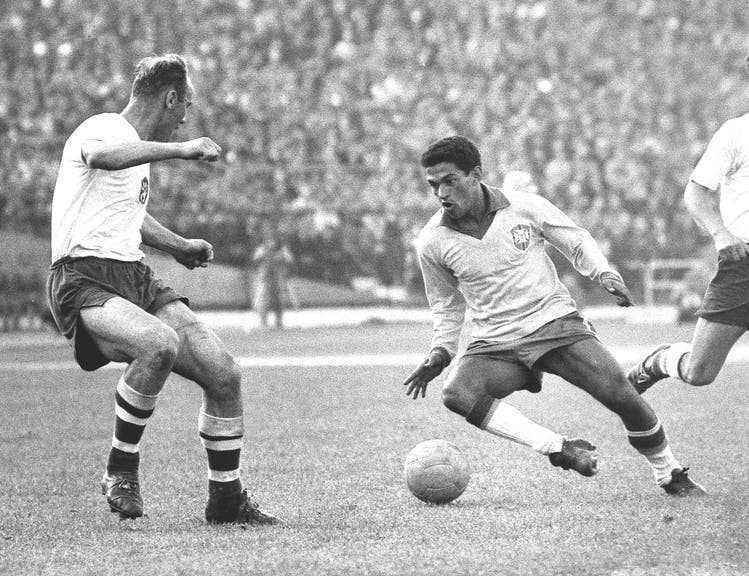
Avoided a ban: thanks to a pardon, Garrincha was allowed to perform magic against Czechoslovakia in the 1962 World Cup final.
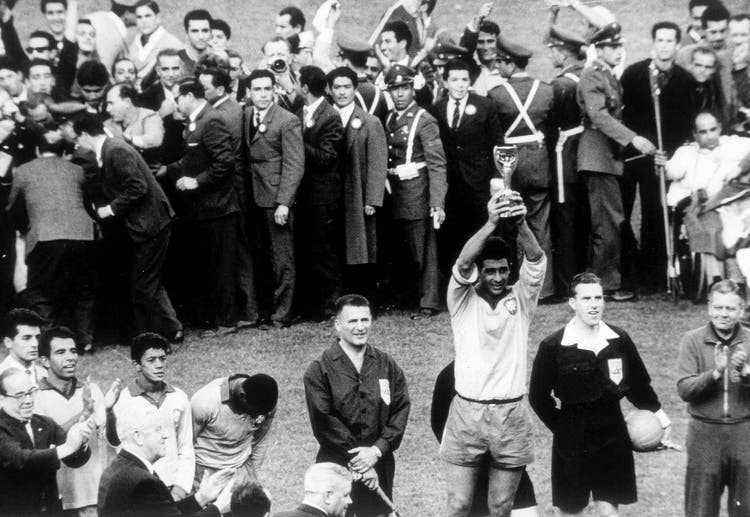
The Brazilians celebrate after winning the World Cup final with the winner’s trophy.
His spine was deformed, his right leg six centimeters longer than the left and he was the Seleção’s charismatic talisman, losing just one cap in 50. Garrincha scored twice in the semifinals in a 4-2 win over Chile. Exposed to the usual sneaky kicks, he lost his nerve in the 87th minute and was thrown off the field.
Thanks to Havelange, Garrincha is in the final – although he should actually be suspended
He would have been blocked for the final. But now the Brazilian association president João Havelange, who later became FIFA boss, played his part. Havelange was the son of an arms dealer, lawyer and originally a water polo player before he revolutionized the world football association – and was convicted of corruption in old age.
Back in Chile, he managed to convince the chairman of the Disciplinary Committee to leave immediately for vacation. The Garrincha file therefore remained untouched, which effectively meant the pardon. Brazil defeated Czechoslovakia 3-1 in the final.
Garrincha died of liver cirrhosis in 1983 at the age of fifty, mourned by 14 children and millions of Brazilians who lined the funeral procession in Rio de Janeiro from Maracanã Stadium to the mausoleum. The traffic lights stayed off. The strange World Cup in Chile was probably long forgotten.
